- Home
- Warwick Deeping
No Hero-This Page 7
No Hero-This Read online
Page 7
I go and look. I can see no bread; nothing but empty shelves. I return to Clayton and break the news to him. He smiles whimsically.
“Well, that puts us out of the way of temptation. Someone else has fallen before us.”
A rhapsodical sunset ushers in the dusk, but we are not at all interested in the sunset. The sky’s gastric membranes may flush, but ours are starved and pale. We go down to the saloon, but the place is in darkness, for we are allowed no lights. We sit in the darkness. I am aware of Clayton getting up and gliding off like a ghost. Presently he comes back to me and whispers.
“I’ve found something.”
He takes me to where a crowd of Tommies are sprawling on the deck. A half-empty barrel stands against the wall of a deck-house. Clayton dips into it; so do I. We sneak away each with a handful of broken ration biscuits. That is our dinner. We sit and crunch them. I hear Clayton say, “How one’s social morality wilts after half a day’s starvation!”
It is a night of black velvet pricked with stars; the sea is black silk, the silence utter, save for the boat’s movement through the water. I have heard no orders given as to silence, but no one on board seems to be talking. It is a ghostly business, and the night air is growing cold. Clayton and I have put on our coats and are leaning over the ship’s rail, watching the water slide by like a sheet of black glass. I am conscious, not only of hunger, but of a feeling of inward tension, for, in an hour or two we shall be treading a shore that has become terrible and historic. Helles! There is beauty in the name, but I wonder what beauty I shall find in this tragic land.
Clayton speaks to me.
“I hope we shall be able to keep together.”
I feel his sleeve touching mine. He is such a fragile, sensitive creature that I wonder how he will stand the strain of active service. And how shall I?
“I suppose we shall be attached to some field ambulance. Do you know anything about ambulance work, Brent?”
“Very little. But I suppose one soon has one’s face rubbed in reality.”
We become aware of movement on board, voices, the stirring of men to whom something has become visible in the darkness. We see lights, like pin-holes in black cardboard, hundreds and hundreds of yellow pricks. We are puzzled. A shadowy figure joins us. We ask it to explain all those strange lights. He is an officer who has been wounded and who is being returned to duty.
“That’s the nightly candle show at Helles.”
“But are lights allowed?”
“Those are lights in the dug-outs along the cliffs.”
The land looms nearer, dimly substantial. Our steamer oils her way in to what appears to be an improvised quay. She ties up, and we wait for orders to disembark. The night is strangely silent, secret and surreptitious. No gunfire, nothing. An officer comes on board and tells us that we are not to disembark before the morning.
We all gather in the saloon where someone has lit a candle. Where do we sleep? O, where we can. There is a scramble for places. Clayton and I lie down on a saloon table with our haversacks under our heads. Tables and seats are all requisitioned. Will it be possible to sleep on this hard board, with hunger active inside me? There are uneasy stirrings, heavings, sighs of resignation.
I begin to feel drowsy. Someone starts to snore with catastrophic and complacent energy. A man on the bench behind me curses the snorer.
“Damn that fellow!”
But the fellow goes on snoring. I lie very still and try to will myself to go to sleep. I want to sleep, to forget. I remember that I have been constipated for two days, and had meant to take a pill. Well, I suppose that is reality!
I wake soon after dawn, stiff, depressed and hungry, and through the saloon window I get my first daylight glimpse of Gallipoli, an improvised pier, sand, brown earth, piles of stores, a few figures in khaki. Everything but the water seems to be some tint of brown. The saloon is full of uneasy awakenings. We are a towsled, morose crowd. There appears to be no chance of our washing or shaving, for we have not so much as a tin mug between us.
We are ordered ashore. It is a serene and sunny morning, the sea like glass. Our kits are brought off for us, and Clayton and I sit on our valises close to a pile of stores. I am beginning to feel faint and giddy with hunger, and Clayton’s face is like the face of a corpse. How we soft civilians wilt after a day’s semi-starvation! No one takes any notice of us. We sit and wait, and watch our steamer being unloaded. My head begins to ache.
Someone who is irritable with hunger begins to swear.
“Well, this is a bloody sort of side-show. We might be sacks of potatoes. What the hell do they expect us to do?”
The irritable person storms off towards an officer who appears to be supervising the landing of stores. We watch them. The irritable person comes back.
“He says we had better report to Corps Headquarters. It’s up above there somewhere.”
Leaving our kits we climb the low, brown cliff by a dusty track that brings us to a plateau that is scarred and pock-marked with trenches and holes. We see the white tents of a hospital away on our right, and in the distance, beyond the soundless sea, the coast of Asia. We have been put ashore at Lancashire Landing. We stumble about, searching for authority, and I feel that I am going to be sick. The irritable person continues to be our guide and energizer. He accosts a Tommy who looks at us without interest, but who puts us on our way.
We come suddenly upon Corps Headquarters secreted in a kind of rabbit-warren, a series of underground shanties. The D.D.M.S.’s office is our goal. We find it, and stand crowded together in mute and hungry depression. A staff-officer comes out and looks at us.
“Who and what are you?”
The irritable person informs him that we are officer reinforcements, and that our principal interest is breakfast, and a shave. I gather that our arrival is unexpected, and somewhat unwelcome.
“Better not hang about up there. Come down and I’ll take your names. Then you can go across to the hospital and see if they can feed you.”
He takes our names, and tells us to report later for orders. We leave him smoking a cigarette and looking vaguely amused. I suppose we must appear a somewhat grotesque and helpless lot to a man who is neat and shaved and in authority. We tramp across to the white tents and marquees of the hospital. I hear someone say, “What the hell are we doing here? No one seems to want us.” My head is beginning to crack, and I am sick with hunger, and this strange brown world seems to heave under my feet. But the hospital takes immediate pity on us, and with an efficiency that salves our souls. An officer comes out to meet us. He seems to understand our case. We are told to squat, and that breakfast will be improvised for us. Some of us cheer.
Breakfast. We crowd into a marquee, and sit on benches at a trestle table. There is bully beef, bread, marmalade, strong tea. Never has the animal in me been so unashamedly gross and greedy. My headache departs. We sit in silence, gorging. I see the colour come back to blanched faces. Clayton, who is next me, gives a sigh like a surfeited schoolboy.
“Afraid I can’t manage any more.”
Gorgeous sense of repletion! We light pipes and cigarettes and become genial. I remember my constipation, and my urge is to relieve it. Everybody’s urge seems to be towards the latrines.
* * *
Corps Headquarters has decided upon our fate. Clayton and I are to be separated, though, when giving in our names we had asked, if possible, to be sent to the same unit. I suppose these obscure friendships cannot be recognized in a war. I and fat Sanders of the revolver are to report to the A.D.M.S. of the North Lancs Division; Clayton is to become a Scotsman and to serve with the 52nd. Our staff-officer informs us that motor-ambulances will be evacuating cases to the hospital, and that they will provide us with transport to our respective divisions.
We walk back to the hospital and sit down on the brown soil in the sun. The hospital has sent orderlies to collect our kit. I am sorry to be separated from Clayton, for we understand each other and are sympathetic
towards each other’s idiosyncrasies.
“I think that damned fellow might have listened to us.”
Clayton gives me a wise and whimsical look.
“I am discovering, old man, that one should not get involved in a war unless one is able to exercise some sort of authority.”
* * *
Sanders and I are making our first journey into this fantastic world, a world of dust and of dun-coloured earth and shabby scrub and heather. Looking back from the ambulance as through a spacious window we can see the sea and Asia, and the brown road, a few miserable olive trees, and a disorder of shallow trenches and holes roofed with ground-sheets, and men in grey shirts and brown trousers or shorts loafing in the sun. The road follows the line of the cliff, but at a little distance from it, and the ambulance rolls and bumps. I look at my valise and am struck by the thought that that green thing has known the interior of my English home, and has travelled all this way with me. I regard it as a mute and melancholy friend.
Helles seems all sunlight and silence. I have not yet heard the sound of a gun.
“There doesn’t seem much war on,” says Sanders.
The ambulance descends the spirals of a hill, and we find ourselves close to the sea, and near the mouth of a huge cleft in the plateau. The ambulance stops and the orderly comes round to tell us that we have arrived. He is an undersized Lancashire lad with a swollen and bumpy forehead and an infantile face. He points out Divisional Headquarters to us at the mouth of the Great Gully. It reminds me of the descriptions of some ancient, monkish settlement in an Egyptian desert. We climb a narrow, winding path and arrive at the office of the A.D.M.S. It suggests a home-made fowl house tucked into an earthy recess, with open windows looking towards the sea.
A grey-haired officer with a pleasant, weather-worn face is sitting at a rough table made of boards laid upon ammunition boxes. He is without his cap and going bald. He looks at us with shrewd, kind eyes as we salute and stand waiting in the doorway. I am aware of innumerable flies, and of an orderly clattering away at a typewriter. I see the colonel glance at Sanders’s revolver, and smile far back in his cool blue eyes.
“Come in, gentlemen.”
We present our order. He reads it, eyes us kindly but critically, and asks us what experience we have had. We confess to our lack of experience, and again I see him glance at Sanders’s revolver. That, at all events, should be a symbol of Sanders’s utter and infantile greenness.
“Hirst.”
“Yes, sir?”
“Draft a letter to Colonel Frost of the 3rd. Say that Lieutenants Brent and Sanders are to be attached to his ambulance for training and duty.”
“Very good, sir.”
“And send someone down with these officers to Colonel Frost’s headquarters.”
“Yes, sir.”
Our guide takes us back to the sea and an embryo pier. We turn to the right along an earth road that runs between the sea, and the immediate and tawny cliffs. The 3rd North Lancs Field Ambulance is located about a hundred yards along this dirt track. I see a cookhouse, stores, a sandbagged structure roofed with tarpaulins, and cut in the cliff tiers of little terraces carrying rude shelters and dug-outs. Between the sandbagged structure and the store-shed is a narrow, oblong space with a table and benches, and covered in with canvas. On its side towards the road it is open to the sea.
Three officers are sitting at the rough table in this recess, and to me all three of them have a bleached look like fabric that has been exposed too long to the sun. Their drill tunics and shorts, and their shirts and collars are a light, biscuit colour. Their faces give me the impression of having lost their sun-tan and become waxy and almost corpse-like. Even their eyes are pale. These men strike me as being profoundly discouraged and cynical and tired. They look at us with silent unfriendliness. I notice that the enamelled plates and mugs on the table are chipped and shabby, and that this miserable little mess is swarming with flies.
We salute, and I present the A.D.M.S. chit to the man who is nearest to me, and who by his badges I know must be Colonel Frost. He has a broadish face, hair the colour of sand, pale eyes that are neither green nor blue. It is a hard face with a compressed mouth, and broad nostrils. I notice that everything about him is meticulously neat and clean, and I gather that whatever he has suffered, the surface of him is like polished alabaster.
He reads the order, lays it beside his plate, sniffs, and looks at us cursorily and with cold eyes. I see him glance at Sanders’s revolver, and his nostrils spread. The two junior officers are spooning up rice and tinned apricots, and their interest in us seems perfunctory. One of them has a sallow, baby face; the other is lean and dark with very intelligent eyes.
There is a pause, an unfriendly silence, and we wait there self-consciously. I get the impression that we are regarded as unwelcome strangers thrust upon a close community of three.
Frost sniffs at us. It appears to be a habit of his, and not a method of expression.
“No previous experience, I suppose?”
“No, sir.”
“Had lunch?”
“No.”
Frost shouts for Smart. He has a rather high-pitched, metallic voice, a voice that produces hasty obedience in other men. Smart is the mess-orderly, a frightened, puffy lad who looks as though he had suffered from adenoids as a child.
“Lunch for two officers.”
Smart looks at us blankly and disappears. We are not asked to sit down, but we insinuate ourselves into the narrow space and squat at the shady end of the table. The wall on that side is soil. Smart comes back, and speaking as though he had a marble in his mouth, asks for our mess-plates. We explain that we have none. Frost sniffs.
“Find something, Smart.”
“Yessir.”
We sit in embarrassed silence, and I feel that it is paradoxical that we should have travelled all these hundreds of miles to find ourselves so unwelcome to other Englishmen. Are we regarded as useless and untrained intruders? Smart reappears with two battered plates, and upon each plate a cube of bully-beef, and a slice of bread. We have nothing to drink out of, and no knives and forks. Frost has lit a cigarette and sits sniffing its aroma. He appears aloofly conscious of our lack of experience and of such necessaries as knives and forks. I feel that he wishes us to realize how raw we are.
The dark man with the intelligent eyes becomes suddenly restless.
“Smart.”
“Sir?”
“Didn’t Captain Jordan and Mr. Homes leave their mess things behind?”
“Yes, sir.”
“Well, hunt them out.”
Colonel Frost stares sharply at my neighbour. There seems to be some tension between these two, but the colonel gets up, walks across the earth road to the beach and stands gazing at the sea. He is a well-built and powerful person, with a compact neck over which his hair grows in crisp little tufts. Are these other men afraid of him? I glance at my new friend whose name is Makins, and smile faintly. He returns the smile.
“Things are a bit tight here.”
“So it seems. Everything is rather new to us.”
“O, you’ll soon find out.”
Smart reappears with mugs, and knives and forks, meanwhile, I keep moving the flies off my bully beef. The baby-faced officer has been studying us across the table. He has what I should describe as an expression of perpetual fear concealed beneath a surface of cheerful cheekiness.
“Either of you play Bridge?”
“We both play Bridge.”
“Well, that’s something in your favour.”
Colonel Frost returns from contemplating the impersonal calmness of the sea. I am to discover all sorts of unexpected qualities in this hard-faced man. He drops the end of his cigarette into a tin that serves as an ash-tray, sniffs, and curtly addresses Sanders.
“Which one are you?”
“I’m Sanders, sir.”
“Very well, Mr. Sanders, when you have finished your lunch you will throw that toy pistol of yo
urs into the sea.”
Sanders looks up at him as though eager to propitiate him and to share the joke against himself, but Frost is not joking.
“I don’t want the men laughing at an officer.”
He walks off, and Sanders, suddenly deflated, asks Makins a question.
“Do I really have to do that?”
Roberts of the baby face grins at him.
“Better do it before he asks you whether you have done it.”
Sanders says, “Well, I’m damned,” but he extracts that absurd weapon from his belt, and going down to the beach, tosses the thing into the sea.
VI
So, this is Gallipoli!
I have been handed over to Makins to be lodged and lectured. Makins takes me up a path to a row of small sandbagged and tin-roofed dug-outs strung along a narrow terrace cut in the cliff. Three of these dug-outs are vacant, and Makins puts me into the one next to his. My kit is carried up by two R.A.M.C. privates, and I find that there is just room for my camp-bed, and space to stand beside it.
I ask Makins to show me the latrine. He points out a structure like a sentry-box perched just below our terrace, open to the sea and the gaze of men. Have I got to sit there? I decide to make the experiment after dark. Makins squats on my camp-bed while I unpack. There are some shelves in the dug-out. Makins both interests and attracts me; he has an air of strained courage and of laconic and almost bitter candour.
“Care for a walk before tea?”
A walk? Does one go for country walks on active service? But, perhaps he has been ordered to show me round and get me hardened off.
“I have to go up to our A.D.S. in the Gully. Roberts is on duty here.”
“It seems very quiet. Are there many wounded?”

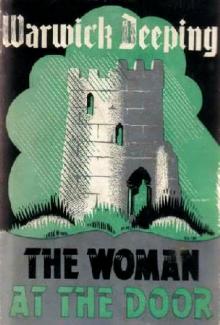 The Woman at The Door
The Woman at The Door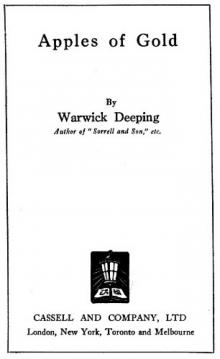 Apples of Gold
Apples of Gold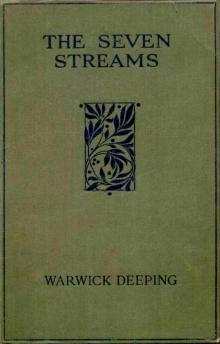 The Seven Streams
The Seven Streams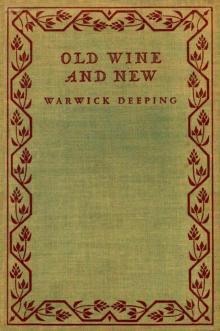 Old Wine and New
Old Wine and New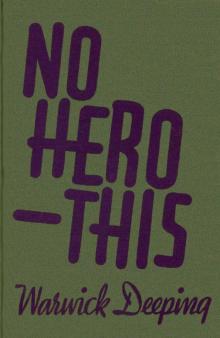 No Hero-This
No Hero-This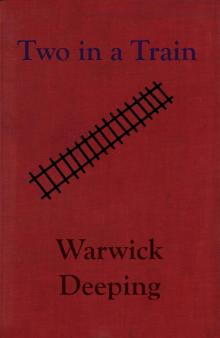 Two in a Train
Two in a Train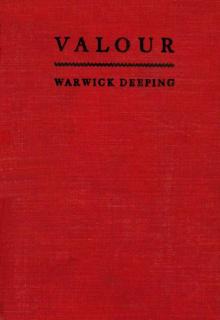 Valour
Valour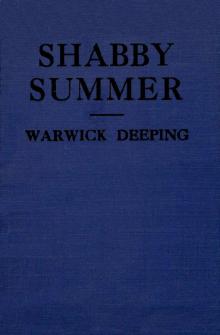 Shabby Summer
Shabby Summer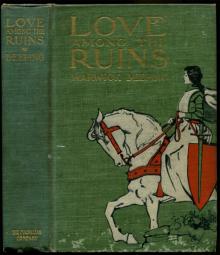 Love Among the Ruins
Love Among the Ruins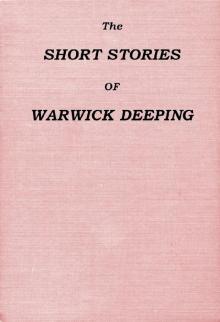 The Short Stories of Warwick Deeping
The Short Stories of Warwick Deeping